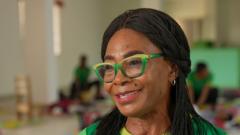In Nigeria, 22-year-old Babatunde "Baba" Fashola, who has cerebral palsy and stands at only 2ft 4in, symbolizes a pressing issue faced by many children struggling with the condition. At the Cerebral Palsy Centre in Lagos, Baba is among those receiving dedicated care from Nonye Nweke, the center's founder, who knows all too well the hardships present in caring for those with permanent brain damage. Having started the center a decade ago, Nonye was inspired by her own experiences as a single mother of a daughter with cerebral palsy, faced with societal stigma and inadequate support.
Cerebral palsy is prevalent in Nigeria, with an estimated 700,000 people affected, primarily due to untreated neonatal jaundice — a condition that can result from a common birth complication marked by excess bilirubin in newborns. Professor Chinyere Ezeaka from the Lagos University Teaching Hospital notes that over 60% of infants experience jaundice, yet many fail to receive prompt treatment due to a lack of healthcare resources. Neonatal jaundice treatment is essential within the first 10 days post-birth to avoid irreversible brain damage leading to conditions like cerebral palsy.
Nweke’s dedication manifests in her daily operations at the center, where twelve children benefit from around-the-clock care, funded solely by donations. However, the demand for services far exceeds what the center can provide, with a waiting list exceeding 100 applications. The financial burden of care — roughly $1,000 per month in a country where the minimum wage is approximately $540 per year — makes it challenging to accommodate more children without additional support.
As Nweke shares her emotional journey, she reflects on the stigma surrounding disabilities in Nigeria. There are widespread beliefs that children with congenital disorders are cursed or bewitchments, leading to further ostracism and abandonment. The stigma has fueled Nweke's mission; she passionately works to educate and raise awareness, ensuring that children like Baba and her daughter Zimuzo are cared for and understood.
Various initiatives, like the Oscar Project, aim to combat these issues by enhancing the diagnosis and treatment of neonatal jaundice. With support from health professionals, the project is set to equip local facilities, train healthcare workers, and reach thousands of mothers with essential information and screening services. This is a crucial step in curbing the preventable cases of cerebral palsy.
In a nation with constrained public health systems, the government acknowledges the goals of the Oscar Project but has yet to take significant action. Advocates like Oscar Anderson, who himself lives with cerebral palsy, strive for a future where every newborn is screened for jaundice, enabling timely treatment to prevent life-altering disabilities.
Despite the odds, Nonye Nweke and her supporters remain resolute in their mission to transform lives, emphasizing that the fight against neonatal jaundice is a collective responsibility.



















